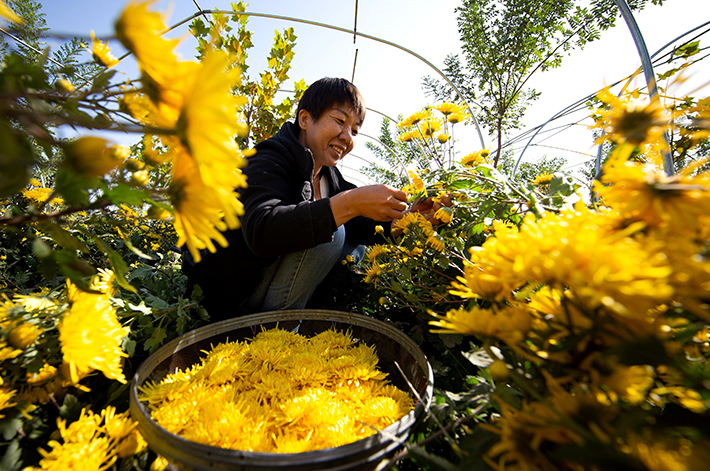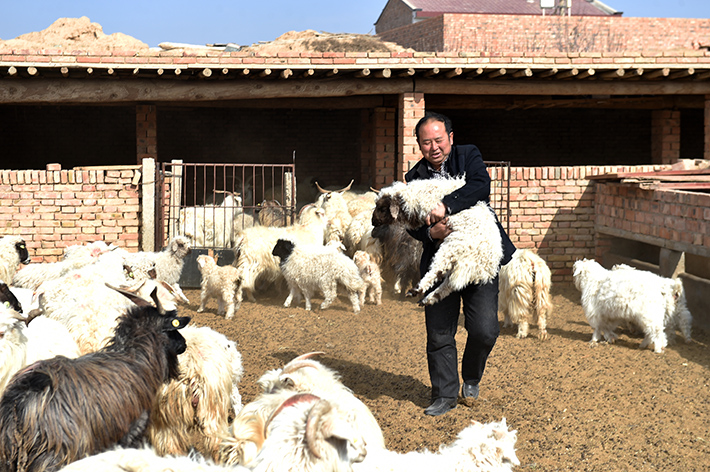|
||||||||||
| Home Nation World Business Opinion Lifestyle ChinAfrica Multimedia Columnists Documents Special Reports |
|
||||||||||
| Home Nation World Business Opinion Lifestyle ChinAfrica Multimedia Columnists Documents Special Reports |
| ChinAfrica |
| Improving Lives |
| Forty years of reform and opening up helps drive poverty reduction in China and globally |
| By Ge Lijun | VOL.10 December ·2018-11-22 |

A villager of Donghexia Village of Hebei Province picks chrysanthemum flowers. All the farmers in the village got rich by growing chrysanthemums (WANG XIAO)
Li Naluo still remembers how isolated and poor her native village was not so long ago: a few thatched huts, no roads or electricity, secluded in the mountains of south China's Yunnan Province. Who would have thought that a few years later, this poor village would rise like a phoenix from the ashes?
"After the 18th National Congress of the Communist Party of China (CPC) in 2012, targeted measures for poverty alleviation have transformed our village. With the help of the government and the efforts of our villagers, we built new homes and a road, installed streetlights and solar panels. Our lives have been transformed," said Li.
Villagers, who mainly belong to the Lahu ethnic group, even managed to develop their own artistic troupe.
"Singing, dancing and playing music are part of the Lahu people's traditions. Several people from the village and I have created a troupe to spread our traditional culture," said Li, deputy chief of the troupe.
Since its creation in September 2013, the troupe has welcomed more than 114,200 tourists and held 895 shows, generating a total of 8 million yuan ($1.15 million) in tourism revenue. Of this amount, 2.26 million yuan ($320,000) were distributed to villagers as their dividends, lifting 383 people out of poverty.
Since the 18th CPC National Congress, which mobilized the entire country into making unprecedented efforts to tackle poverty, more than 60 million people have been lifted out of poverty in China. But this great struggle goes back to 1978, when China launched its reform and opening up policy.
"Reform and opening up initiated the largest process of poverty reduction in the history of humanity, achieving remarkable results: The number of impoverished people in rural China has decreased by 740 million, which is more than 70 percent of the world's global poverty reduction," said Huang Kunming, head of the Publicity Department of the CPC Central Committee, at the International Forum on Reform and Opening up and Poverty Reduction in China, held in Beijing on November 1.
In addition, according to World Bank data, China's share in the world economy increased from 1.5 percent in 1978 to about 15 percent in 2017, while per capita income has risen from $300 in 1978 to $7,300 in 2017.
"As we celebrate its 40th anniversary, it is essential to take stock of China's reform and opening up policy. Understanding China's success will help other countries to better leverage its experience in this area," said Jim Yong Kim, President of the World Bank.
Targeted measures
When the reform and opening up policy was first launched, China's rural areas were critically poor: Policies and measures were needed to uplift most regions. "The situation has gradually changed. We now need to adapt to local conditions to carry out targeted assistance," said Liu Yongfu, Director of the State Council Leading Group Office of Poverty Alleviation and Development.
"We first conducted a census in all villages to verify poor households. Then, we sent officials to take targeted measures to lift these households out of poverty. In addition, we have upgraded infrastructure and public services to gradually improve both production and living conditions in rural areas. Finally, we follow up through rigorous inspection and evaluation," he said, listing some of the measures taken.
Among other things, an approach combining finance and industry, aimed at helping the impoverished communities improve their capacity for endogenous development, perfectly embodies the spirit of targeted poverty alleviation. To this end, appropriate mechanisms have been put in place to encourage financial institutions to provide loans to businesses and cooperatives located in disadvantaged areas.
According to Zhu Hexin, Deputy Governor of the People's Bank of China, the total amount of these loans has now exceeded 950 billion yuan ($136.6 billion), enabling nearly 10 million people to enter the labor market. After having improved their professional skills, they are able to sustain themselves without government support and to increase their income independently.
In 2017, Wanglejing Township in Ningxia Hui Autonomous Region negotiated an agreement with Yellow River Rural Commercial Bank and other local financial institutions to facilitate access to favorable loans. A total of 903 households received loans totaling 99.68 million yuan ($14.33 million), an average of 110,000 yuan ($15,820) per household. Many villagers have used these loans to breed Tan sheep, a species found in northwest China, and thus increase their income.

Lu Yongsheng, a farmer in Wanglejing Township of Ningxia Hui Autonomous Region, is out of poverty by raising Tan sheep (LI RAN)
International cooperation
At present, more than 30 million Chinese are living below the national poverty line and more than 700 million people globally are still living in extreme poverty, according to the World Bank. The eradication of poverty thus remains the biggest challenge facing China and the world.
"While striving to eliminate its own poverty, China will support and assist developing and least developed countries lift themselves out of poverty; China will also join in the efforts of international organizations such as the World Bank and the United Nations Development Program," Huang said.
This is embodied in a number of concrete cooperation projects, particularly in Africa. "We have several partnerships with China to better assist small producers in terms of production and processing. We welcomed Chinese delegations in July and December, and another one will come soon," Mbene Dieye Faye, Coordinator of the Agricultural Policy Support Project at Senegal's Ministry of Agriculture and Rural Equipment told ChinAfrica.
Moreover, China also attaches great importance to its relations with international organizations working in poverty alleviation. "It can be said that China's successful experience is a balanced mix of self-reliance and international cooperation," said Jin Liqun, President of the Asian Infrastructure Investment Bank (AIIB).
"China's purpose in creating the AIIB was to help other countries develop themselves. But we are also helping China itself, mainly for demonstration purposes. Last year, we launched a project to replace coal with gas in the suburban areas of Beijing, which is in line with the implementation of the Paris Agreement, the new global agreement on climate change," he told
(Comments to glj@chinafrica.cn)
|
||||||||||||
| About Us | Contact Us | Advertise with Us | Subscribe |
| Copyright Beijing Review All rights reserved 京ICP备08005356号-5 京公网安备110102005860号 |